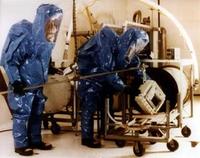-
Listeria outbreak grows worse, 18 dead and 100 sick

The nation’s deadliest food-borne outbreak in a decade continues to grow worse with the Centers for Disease Control and Prevention (CDC) reporting a total of eighteen deaths from listeria-infected cantaloupe
-
-
Food safety grant to fund research on preventing food-borne illnesses

A $1.3 million grant to develop a new food-safety training program for government and industry has been awarded by the U.S. Food and Drug Administration (FDA) to the University of California, Davis, School of Veterinary Medicine
-
-
Anthrax vaccine contract worth up to $1.25 billion over five years
Emergent BioSolutions has been awarded a contract to supply the U.S. government with FDA-licensed anthrax vaccine; the 5-year contract a has a total value of up to $1.25 billion; the first 8.5 million doses will be delivered before the end of the year
-
-
New Zealand relaxes passenger X-ray screening requirement
To save money and speed up the processing of international passengers, New Zealand no longer requires 100 percent screening of bags of passengers entering the country; Kiwi farmers are worried about the move carry the risk of introducing animal disease into the country; the 100 percent screening mandate was imposed after a foot and mouth outbreak in 2001
-
-
U.S. inspects only 2 percent of all imported food
Each year one in six Americans — 48 million people — gets sick, 128,000 are hospitalized, and 3,000 die from foodborne diseases; the FDA uses a risk-based system to isolate foods with high risk of contamination, but physically inspects only about 2 percent of all imported food
-
-
Millions of yet-to-be-described viruses found in raw sewage

There are roughly 1.8 million species of organisms on planet Earth, and each one is host to untold numbers of unique viruses, but only about 3,000 have been identified to date; a new study reveals a vast world of unseen viral diversity that exists right under our nose — in ordinary raw sewage, to be precise
-
-
Report: anthrax antibiotic should be stockpiled locally
A new report describes a plan for the United States to be better prepared in the event of a bioterrorist attack using anthrax; the report recommends that public health officials in high-risk areas should consider stockpile anthrax antibiotics in local locations to make it easier to dispense quickly to an area of need, rather than continuing to use the single national stockpile
-
-
Contaminated cantaloupe outbreak deadliest in decade

The recent listeria outbreak that has sickened seventy-two people and killed as many as sixteen, is shaping up to be the deadliest U.S. food-borne disease outbreak in more than a decade
-
-
Elusive killer parasite being traced in Peru
Chagas disease, primarily seen in South America, Central America, and Mexico, is the most deadly parasitic disease in the Americas; Penn epidemiological study takes snap shot of long-term Chagas disease outbreak
-
-
Real-time disease monitoring can help improve diagnoses
Discovering epidemics or knowing when one is brewing is particularly difficult at the local level as doctors lack a broader perspective of what is occurring; to help provide local doctors with better information that could help stem the spread of infectious diseases, public health officials are pushing for the creation of a real-time national disease monitoring system
-
-
Study finds traces Japanese radiation in U.S. rain and food
A recently published government study found that following the nuclear accident at the Fukushima Daiichi power plant in Japan, elevated levels of radiation were detected in U.S. rain water as well as vegetables and milk
-
-
Japanese attenuated smallpox vaccine shows promise in U.S. trial
An attenuated smallpox vaccine that was developed in Japan in the 1970s compared well with a conventional smallpox vaccine in a phase 1-2 clinical trial in the United States
-
-
FDA unveils new outbreak response network

Last week, the U.S. Food and Drug Administration unveiled its new streamlined approach for responding to foodborne illness outbreaks; under the “CORE” Network, the FDA Coordinated Outbreak Response and Evaluation Network, the FDA will bring together multidisciplinary teams consisting of epidemiologists, veterinarians, microbiologists, environmental health specialists, emergency coordinators, and risk communications specialists
-
-
Mapping the spread of drug-resistant influenza

The movie “Contagion” is not based on real events, but it is not science fiction, either: certain strains of influenza are becoming resistant to common treatments; a team of researchers map out how this phenomenon is happening globally
-
-
Budget cuts could hurt biodefense efforts

With lawmakers struggling to reduce spending and cut the deficit, funding for government programs aimed at thwarting biological threats could face severe budget cuts; while the budget for overall civilian biodefense increased by 17 percent, that number is deceiving as federal agencies consolidated and combined several key programs under larger budget line item headings
-
More headlines
The long view
We Ran the C.D.C.: Kennedy Is Endangering Every American’s Health
Nine former leaders of the Centers for Disease Control and Prevention (CDC), who served as directors or acting directors under Republican and Democratic administrations, serving under presidents from Jimmy Carter to Donald Trrump, argue that HHS Secretary Roert F. Kennedy Jr. poses a clear and present danger to the health of Americans. He has placed anti-vaxxers and conspiracy theorists at top HHS positions, and he appears to be guided by a hostility to science and a belief in bizarre, unscientific approaches to public health.
